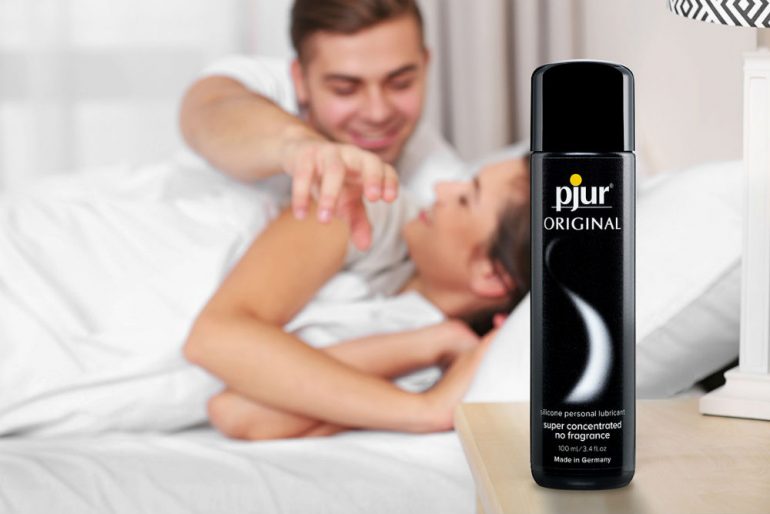
Why there’s no substitute for personal lubricant
Personal lubricants come in various forms: silicone-based, water-based, oil-based and even so-called hybrid products, which are a mixture of water and silicone. They are available from numerous brands and in a vast range of different options. So you’d think there must be something for everyone. Yet there are still lots of people who don’t use a personal lubricant but opt for a substitute instead. In this article, we explain why you should always choose a personal lubricant and which alternatives are anything but a good idea.
Why personal lubricants, anyway?
Personal lubricants are usually used when a woman isn’t wet enough. If the female intimate area is too dry, it can be painful for both men and women. Yet instead of using a personal lubricant and making it easy for themselves, a lot of people still have the mindset that they don’t need personal lubricant as everything is in proper working order down there. Having the lubrication you need during sex has absolutely nothing to do with whether or not things are in proper working order, however. Hormone fluctuations may to be blame, or your monthly cycle. What’s more, there are some areas which have no natural lubrication, meaning that a personal lubricant is always needed to be able to have pain-free sex. This is true of anal sex, for example. Using a personal lubricant usually also means you can simply enjoy longer sex, too. And silicone-based personal lubricants are also great for massage, for example.
There is a wealth of benefits to using a personal lubricant, then. In contrast, the lubricant substitutes below are not recommended.
Personal lubricant substitutes that are better left well alone
Vaseline
Even though there are now countless different personal lubricants on the market, many people still reach for the Vaseline instead. And of course, Vaseline does have the advantage of providing the necessary lubrication, but this is outweighed by its disadvantages. Not only does Vaseline have a greasy consistency that is far from pleasant, but it’s also not water-soluble. This leaves the question of what happens to the Vaseline once it is inside your body. It cannot be broken down, and worse still it strips the sensitive mucous membranes in the vagina of vital moisture, which can even result in a bacterial infection. Women can also feel itchy or suffer from skin irritation as a result of using Vaseline. This may be due to the fact that Vaseline is usually sold in a large tin that lasts an eternity. It is therefore often used, even when it’s already been open for a long time and may even contain large amounts of bacteria. So hands off the Vaseline!
Saliva
It may well be the easiest substitute to find for personal lubricant: saliva. Not only is it always available and close at hand, but it doesn’t cost anything, either. Yet these advantages shouldn’t hide the fact that countless viruses can be transmitted in human saliva. Open cuts in the mouth, which you may not even be aware of, can lead to bacteria being transmitted to the mucous membranes in the intimate area. And what’s more, saliva only lubricates for a very short amount of time. Before you know it, that lubrication is gone again.

Shower gel
Yes, shower gel is a quick fix people often reach for—especially in the shower. Yet you should avoid it at all costs. The female intimate area is an acidic environment, with a pH of 4 to 4.5. This protects the female intimate area from bacteria, enabling it to fight bacteria independently. Shower gels, shampoos and lotions usually have a pH of between 8 and 10. Applying them to a woman’s intimate area will upset the balance big-time. The result can be a fungal or bacterial infection or inflammation. So, again, this is another substitute that’s best left well alone 😉
Oil / baby oil / coconut oil
Unfortunately, oil is another substance still used as a substitute for personal lubricants. It’s important to be careful with oils. If you’re using condoms, you need to know that oils will make the latex in the condom porous, meaning that it will no longer offer the protection it should. Sex toys also quickly fall victim to oil, breaking as a result. As a general rule, oils are also far from pH-neutral and therefore shouldn’t be used in a woman’s intimate area. Oils can also encourage fungal infections.
Water
At first glance, water may seem like a logical choice. Yet when used in the intimate area, sadly it actually has the opposite effect to the one intended. If you use water as a substitute for personal lubricant, it can even drive out the substances naturally produced in the body and make women even drier than they were in the first place.
Creams
You shouldn’t be using any kind of creams as a substitute for personal lubricants. For one thing, you have the problem that they aren’t water-soluble and therefore stay in the intimate area. And for another, creams usually consist of perfume, alcohol and even some chemicals that can really be quite nasty for a woman’s intimate area. The result, among other things, is a fungal infection—because using perfumed creams as a personal lubricant disturbs the vaginal flora.
In some cases, the reason many people don’t use a personal lubricant is that they simply don’t have it to hand. So why not simply hide some in various places around your home? Another reason, however, is that many people are still embarrassed about buying personal lubricant from the chemist. You can order our pjur personal lubricants online with complete discretion. So you can still enjoy all the benefits of using a personal lubricant—and no one needs to know!

